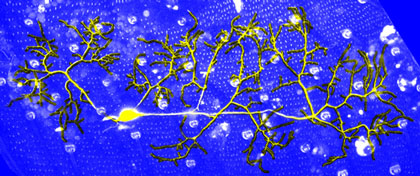 Artist's rendition of dendrite regeneration in a fruit fly during metamorphosis. (Chay Kuo Lab, Duke University)
Artist's rendition of dendrite regeneration in a fruit fly during metamorphosis. (Chay Kuo Lab, Duke University)
Researchers at Duke University are interested in understanding the metamorphosis of fruit flies from larvae to adult stage in an effort to understand how the insects grow new nerve endings as they undergo this transition. What is interesting is that the flies lose neurons they will not need as an adult and will grow new nerve endings. According to a press release from Duke University, a protein called Cysteine proteinase-1 (Cp1) is important in the regeneration step. In fact, their study found that fruit fly nerves cannot regenerate in the absence of this protein.
Since humans are not able to regenerate damaged neurons, the goal is to eventually help humans with brain injuries grow new neurons.
Sources:
Kentaro Kato, Alicia Hidalgo. An Injury Paradigm to Investigate Central Nervous System Repair in Drosophila. JOVE 73: e50306, 2013.
Gray R. Lyons, Ryan O. Andersen, Khadar Abdi, Won-Seok Song, and Chay T. Kuo. Cysteine Proteinase-1 and Cut Protein Isoform Control Dendritic Innervation of Two Distinct Sensory Fields by a Single Neuron. Cell Reports, March 13, 2014. DOI: 10.1016/j.celrep.2014.02.003.

Hi Dr. Dolittle I hope this research will be finished soon, This is going to be so useful and can help those patient who suffered from head/brain injury.
Doh! John McCain and Sarah Palin got it wrong again...
Request more detail info since my grandson has TBI and needs help.
Dear Hector,
I am very sorry to hear about your grandson. While this research is not able to directly benefit humans just yet, here are some links from the CDC and National Institutes of Health on current practices for treating TBI that you and your family may find helpful in your discussions with his physician(s).
http://www.cdc.gov/concussion/get_help.html
http://www.ninds.nih.gov/disorders/tbi/tbi.htm#Is_there_any_treatment
In addition, drug companies are currently studying the effectiveness of cysteine protease inhibitors in the treatment of TBI.
http://www.ncbi.nlm.nih.gov/pubmed/24083575
I hope this helps.
Dr. Dolittle
it's very interesting research Dr. Dolittle.
I'm waiting ...
Aile Terapisti Uğur
I find this quite interesting. But am also compelled to ask about possible future applications in areas other than the brain. Are they also looking into applications on for instance paralyses due to damage to or underdevelopment of nerve tissue in other areas?
This is an interesting and could potentially be the cure or prevention to many fatal mental diseases such as Alzheimer's disease. I see in the paragraph posted by Doctor they say the flies are unable to regenerate new neurons in the absence of the protein (Cysteine proteinase-1 (Cp1)) I'm not sure if humans are able to code for this protein but should we not maybe with the same biotechnology used in manufacture of Insulin we will be able to in the future inject this protein into humans and it too could aid in the regeneration of new neurons in humans. Also with more understanding and research of how exactly the regenaration process happens scientists could come up with another break through in medicine.
This i quite intriguing . This discovery will result in evolution in medical sciences, bringing new technologies and sciences to save lives
Good article once again. Research into this seems to be quite necessary, as having technology that could use this idea potentially would change the living standards of millions of people/families. Definitely something we should be focusing on as future scientists.
This is amazing.This discovery can result in evolution in medical sciences, bringing new technologies and sciences to save lives